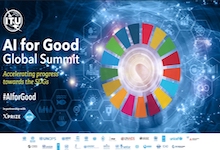Projects in action: Towards AI and data commons (Part 1)
18 May 2018 02:00h
Event report
This session took stock of the role of data across the breakout themes discussed over the previous days, and it proposed a common framework for the way in which data can addressed in the context of AI for good. The moderator, Mr Amir Banifatemi (AI Lead at XPRIZE Foundation) introduced the session and passed the floor to Mr Omar Bin Sultan al Olama (Minister of State for Artificial Intelligence, United Arab Emirates).
Bin Sultan al Olama noted the importance of having gatherings like these, as it is only through collaborating and unifying resources and knowledge that we can obtain the benefits of AI. He furthermore mentioned the Global AI Governance Forum, established by the United Arab Emirates, which brings together AI experts to discuss how to govern AI to be able to reap its benefits while avoiding its potential negative impacts.
Next, Mr Urs Gaser (Executive Director of the Berman Klein Center for Internet & Society at Harvard University) explained that ‘AI for good is only possible when we have data for good’. A team of rapporteurs tracked the conversations in the plenary and breakout sessions of the conference to distill common themes related to data and work towards a first framework while building towards data commons for AI for good. This framework provides a horizontal view across the vertical tracks of the conference, and consists of six layers:
-
Technical infrastructure: servers, clouds, decentralised ledgers, etc.
-
Data: qualitative/quantitative, structured/unstructured
-
Formats and labels: metadata, taxonomies, interoperability
-
Organisational practices: collaboration, incentives
-
Institutions, law, and policy: accessibility, privacy, human rights
-
Humans: knowledge and education
Rapporteurs from each of the tracks provided examples of ideas that fit within the framework:
-
AI + Satellites: there is a need for more on-the-ground data that is standardised and geo-referenced to be paired with satellite data.
-
Trust in AI: there is a need for greater transparency so that those who use the data know how, when, and by whom the data was collected. For example, labels food nutrition labels, readable by humans or machines, which help to prevent using the data in inappropriate ways or ways that introduce unintentional bias.
-
AI + Smart Cities and Communities: there is a need to gather data from experiments and best practices, publicly accessible, so that everyone can take part in the ethical design of solutions to urban and community problems.
-
AI + Health: there is a need for transparency in diagnostic e-health tools, which are sometimes used as ‘substitute doctors’: how to they arrive at their decisions?
Gaser added that ideas, projects, and best practices could be categorised in a common analytical framework, to be able to understand what works best in what context.
Banifatemi then moved the discussion towards private and public data: what should be open and what should be controlled? Bin Sultan al Olama suggested that the answer to this question needs to be made in consultation with citizens, integrating their preferences related to the collection and use of their data.
Asked about ways to standardise data, Mr Chaesub Lee (Director of Telecommunication Standardization Bureau, ITU) noted the large variety of data types that can be distinguished, raising questions related to their interoperability. These questions are currently explored by an ITU focus group. Furthermore, he voiced his concern related to the exchange of data and the lack of transparency of how much data is shared, and with whom. While data sharing is essential for smart operations, it requires adequate protection. In addition, one of the participants in the audience suggested that we need to think about making the potential of AI available for all, preventing skewed distributions of its benefits.
In their concluding remarks, Bin Sultan al Olama emphasised the utility of platforms like the UN to push countries towards sharing data, and Lee added that it is the role of UN agencies to ensure the use of data for good. Gaser highlighted the importance of powerful narratives that demonstrate the potential of unlocking data silos. Finally, the rapporteurs of the four thematic tracks stressed the continued importance of qualitative data, of building a community around data commons, of demystifying stories behind AI, and of working on applied problems rather than abstract concepts.
Related topics
Related event

